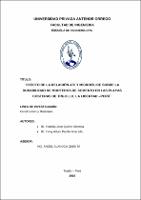Efecto de la relación A/C y microsílice sobre la durabilidad de morteros de cemento en las playas costeras de Trujillo, la libertad - Perú

Ver/
Descargar
(application/pdf: 259.2Kb)
(application/pdf: 259.2Kb)
Fecha
2019Autor(es)
Padilla Alvarado, Irving Arturo
Quiroz Chomba, Fiorella Lisset
Metadatos
Mostrar el registro completo del ítemResumen
En el presente trabajo de investigación se ha evaluado la durabilidad de los morteros de cemento, evaluando dos variables: la acción de la relación a/c y la adición de un aditivo microsílice con la finalidad de obtener un producto menos poroso e impermeable; aplicando un diseño factorial.
En el desarrollo de la tesis se experimentó, observó, evaluó y sistematizó los datos obtenidos en laboratorio referente a tasa de absorción. Los morteros, fueron elaborados con agregado fino de la cantera “Piedras Gordas” ubicada en la vía Panamericana Norte Km 565, centro el poblado el milagro, distrito de Huanchaco en la provincia de Trujillo; así mismo se utilizó Cemento Pacasmayo antisalitre MS y el aditivo hidrófugo Sika Fume. Para ello se caracterizaron las propiedades de los materiales utilizados, se elaboraron las probetas y realizaron los ensayos siguiendo una matriz experimental del diseño factorial 32.
Las probetas siguiendo la actividad basada en la norma ASTM C 192, fueron curadas hasta completar los 7 días de fraguado. En el laboratorio de suelos II y pavimentos de la escuela de Ingeniería Civil en la Facultad de Ingeniería de la Universidad Privada Antenor Orrego.
El método de ensayo se utilizado determino el ritmo de absorción de agua (sorptividad) en el mortero de cemento, midiendo el incremento de la masa de una probeta como resultado de la absorción de agua en función del tiempo cuando solo se expone al agua una superficie de la probeta. Los niveles de la relación a/c fueron 0.40, 0.45 y 0.50 y los niveles del porcentaje en peso del aditivo microsílice fueron 5, 10 y 15 %, el tiempo de tratamiento fue 7 días.
La menor tasa de absorción (sorptividad) obtenida fue 807 g/(m2.h) es decir 0.001345 g/(cm2.min) para una relación a/c de 0.4 y 15 % en peso de aditivo microsílice, en un periodo de prueba de 7 días. In the present research work, the durability of cement mortars has been evaluated, evaluating two variables: the action of the a / c ratio and the addition of a microsilica additive in order to obtain a less porous and impermeable product; applying a factorial design.
In the development of the thesis the data obtained in the laboratory regarding the absorption rate was experimented, observed, evaluated and systematized. The mortars were made with fine aggregate from the “Piedras Gordas“ quarry located in the Pan American Highway Km 565, downtown the miracle village, district of Huanchaco in the province of Trujillo; Likewise, Pacasmayo Antisaltpeter cement MS and Sika Fume hydrophobic additive were used. To this end, the properties of the materials used were characterized, the specimens were prepared and the tests were carried out following an experimental matrix of the factorial design 32.
The specimens following the activity based on the ASTM C 192 standard were cured until completing the 7 days of setting. In the laboratory of floors II and pavements of the school of Civil Engineering in the Faculty of Engineering of the Private University Antenor Orrego.
The test method was used to determine the rate of water absorption (sorptivity) in the cement mortar, measuring the increase in the mass of a specimen as a result of the absorption of water as a function of time when only one surface is exposed to water. of the test tube. The levels of the a / c ratio were 0.40, 0.45 and 0.50 and the percentage levels in weight of the microsilica additive were 5, 10 and 15%, the treatment time was 7 days.
The lowest absorption rate (sorptivity) obtained was 807 g / (m2.h) that is to say 0.001345 g / (cm2.min) for an ratio of a/c 0.4 and 15% by weight of microsilica additive, in a test period 7 days
Palabras clave
Colecciones
- Ingeniería Civil [1302]

